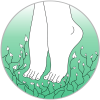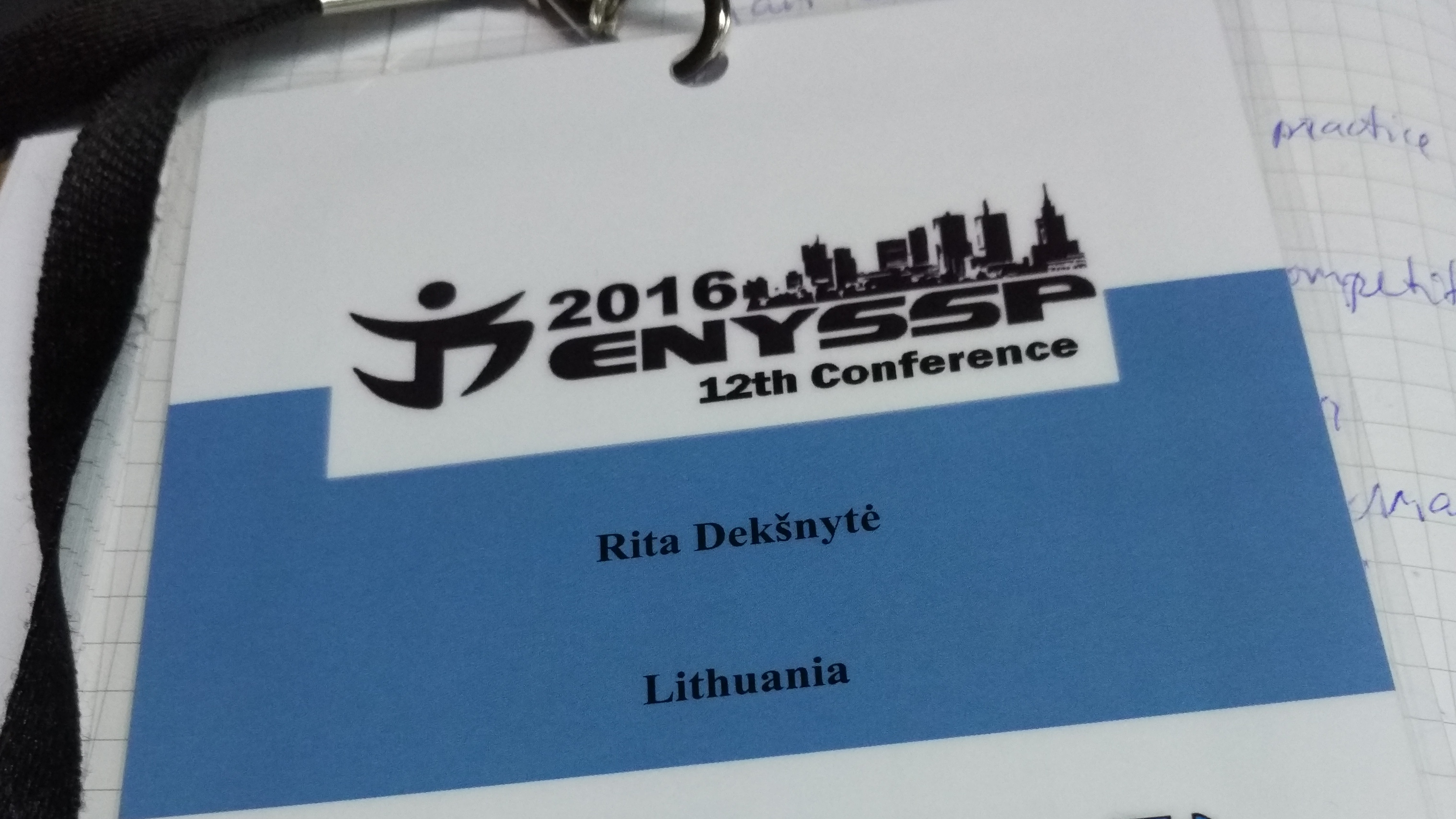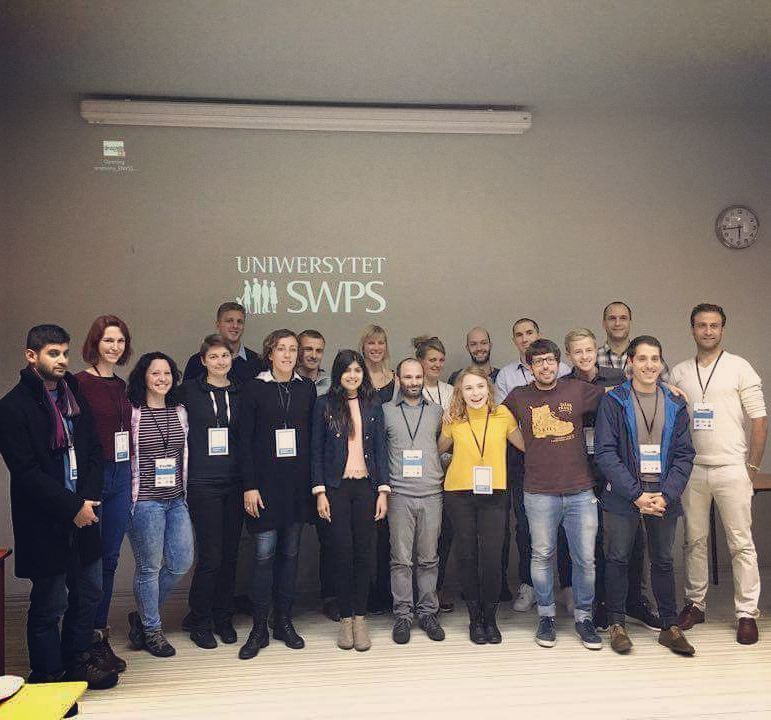Wow, time does fly… This was already my 6th ENYSSP Conference! Yet I am as excited as that first time in Jyväskylä in 2011. Reflecting back on my years of participation I am amazed to witness, how ENYSSP has encouraged and supported young people with a cautious dream of becoming a sport psychology specialist to pursue their dream with confidence.
 The 12th ENYSSP Conference took place on October 21-22 in Warsaw, Poland. With a theme “Professional development: Where can you take sport and exercise psychology?” it gathered around 100 participants from over 20 countries. Great work of the Organizing Committee, fresh ideas of the new Managing Council and expanding Country Reps project all speak of ENYSSP growing and evolving to meet the needs of young specialists.
The 12th ENYSSP Conference took place on October 21-22 in Warsaw, Poland. With a theme “Professional development: Where can you take sport and exercise psychology?” it gathered around 100 participants from over 20 countries. Great work of the Organizing Committee, fresh ideas of the new Managing Council and expanding Country Reps project all speak of ENYSSP growing and evolving to meet the needs of young specialists.
“Are we going to BE or DO?” – was a rhetorical question asked by the ENYSSP president Peter Schneider in the conference opening speech. And so we DID: participate, share, discuss, learn, support, challenge, inspire each other!
Setting the Tone – Keynote Speakers
It is always exciting to have experienced researchers and practitioners sharing their expertise with young specialists. This year yet again we had a strong line-up of keynotes.
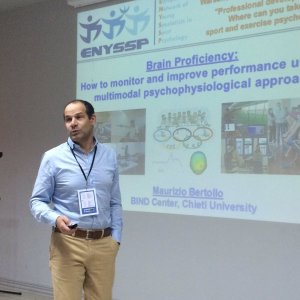 Prof. Maurizio Bertollo (Italy) talked about brain proficiency, monitoring and
Prof. Maurizio Bertollo (Italy) talked about brain proficiency, monitoring and
improving performance using multi-modal psycho-physiological approach. We saw how different the brain activity is in optimal performance states (automated flow-like state or controlled state) in comparison to sub-optimal controlled and automated states. The key to good performance is the ability to move between the states and always have a plan B in case you find yourself in sub-optimal state. Another emerging theme was the need for wireless,mobile brain monitoring devices in order to take brain analysis out of the lab and into the field.
- Prof. Jan Blecharz (Poland) brought to our attention the topic of mental preparation for major international competitions, discussing the specific stressors posed by high-profile events and some response strategies. Although many athletes tend to blame psychological aspects for their poor performance, Jan suggested that athletes must take responsibility for everything that influences their performance before, during and after competition. The role of brief intervention was also discussed with some hilarious real life examples, e.g. “consulting” in the elevator.
- Prof. Martin Hagger (Australia) raised the question – how to get people to change behaviour for themselves by themselves? He discussed models of behaviour change and pointed out the need for evidence-based interventions. A taxonomy of techniques was introduced ranging from fear arousing messages to changing attitudes and promoting self-efficacy. Martin demonstrated how to use research evidence to develop effective practice in changing behaviour. That left the participants questioning the effectiveness of some real life examples of behaviour change strategies.
On the Edge of My Seat – Sprint Presentations
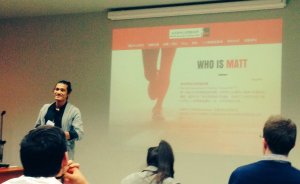 Short presentations was a new concept in ENYSSP events and I do hope it will stick. Nine participants in 90 minutes, each with only 10 minutes to fit their study or experience into. From PhD findings to applied reflections, from narcissism in sports to working with wheelchair rugby – there was something for everyone. The focus and the concentrated passion of the speakers bought me. Sometimes time pressure works wonders!
Short presentations was a new concept in ENYSSP events and I do hope it will stick. Nine participants in 90 minutes, each with only 10 minutes to fit their study or experience into. From PhD findings to applied reflections, from narcissism in sports to working with wheelchair rugby – there was something for everyone. The focus and the concentrated passion of the speakers bought me. Sometimes time pressure works wonders!
Hands-on Experience – Workshops
As usual in the ENYSSP events, a great selection of workshops was available. Unfortunately, one had to choose from several parallel sessions. I had a pleasure to participate in the following workshops:
- Karin de Bruin (Netherlands) turned our
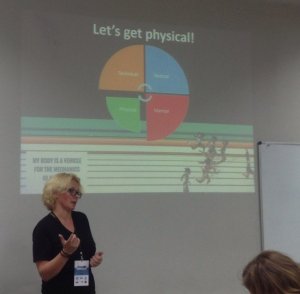 attention to bodies and discussed the role of physical self concept and the tools a sport psychologists can use to work with the topic. We got our hands on some relevant questionnaires, used various techniques to evaluate and compare our perceptions of own body, reality and perceived ideals in our sport and society. A lot of food for thought.
attention to bodies and discussed the role of physical self concept and the tools a sport psychologists can use to work with the topic. We got our hands on some relevant questionnaires, used various techniques to evaluate and compare our perceptions of own body, reality and perceived ideals in our sport and society. A lot of food for thought.
- With Sara Biondi (Italy) we discussed coaching philosophies, watched several excerpts from movies about sports and analysed in groups the philosophies of coaches in those movies. There were some heated discussions as nothing was as it seemed at first glance. It really made one think about the complexities and situational influences on coach’s behaviour and attitudes.
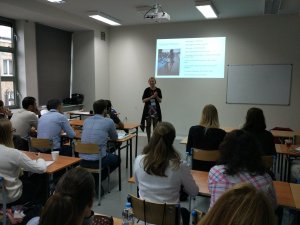 Karolina Chlebosz (Poland) invited us for the session on relaxation and regeneration, where we discussed various techniques to optimise our arousal levels and participated in a guided meditation. The main idea I take out of the workshop is that one should plan and schedule (literary put in your calendar!) relaxation and regeneration. Sometimes we all need a reminder of that 🙂
Karolina Chlebosz (Poland) invited us for the session on relaxation and regeneration, where we discussed various techniques to optimise our arousal levels and participated in a guided meditation. The main idea I take out of the workshop is that one should plan and schedule (literary put in your calendar!) relaxation and regeneration. Sometimes we all need a reminder of that 🙂
- Maciej Behnke (Poland) put our minds and bodies through a real challenge at the end of the tiring second day with a session on Kinesiotrapping. We got simultaneous mental and physical tasks to perform and had to maintain our focus through Maciej’s creative distractions such as headstands on a table and singing. It is now up to our creativity to adapt what we have learnt to our own practice.
I am sure that colleagues who attended different workshops had equally valuable experience.
All that Buzz
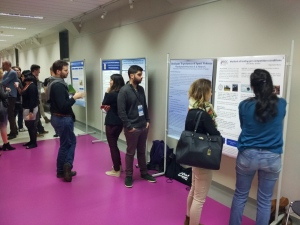 Coffee breaks, lunch time – sounds like time to relax between sessions? Oh no, it was the time to meet new people, network, catch-up with old friends and colleagues (some had come from really far!), hug, share updates, approach the speakers with questions, discuss impressions of conference programme, plan reunions, etc. The corridors of the venue were buzzing. I can still feel some ringing in my ears and I still carry that positive energy with me!
Coffee breaks, lunch time – sounds like time to relax between sessions? Oh no, it was the time to meet new people, network, catch-up with old friends and colleagues (some had come from really far!), hug, share updates, approach the speakers with questions, discuss impressions of conference programme, plan reunions, etc. The corridors of the venue were buzzing. I can still feel some ringing in my ears and I still carry that positive energy with me!
To conclude, thank you ENYSSP for yet another excellent event! See you throughout the year during Webinars and Consultations. And in 2017 in Bratislava! 😉
